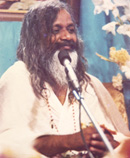
|
|
New book—The Flow of Consciousness: Maharishi Mahesh Yogi on Literature and Language A New Collection of Maharishi’s talks—from 1971 to 1976 Press As Maharishi Mahesh Yogi traveled the globe over the years lecturing on meditation and training thousands of teachers, he met with many of the greatest minds of his generation—who practiced the Transcendental Meditation technique or sought discourse with him at symposia on consciousness. Maharishi also spoke at length on language and the literary process, about writing and creativity, always emphasizing the importance of developing higher consciousness for both reader and writer. Flow of Consciousness is a new compilation of lectures on literature and language recorded during Maharishi’s 1970s lecture tours around the world and from his discussions with leading scientists and scholars. A sampling of lecture titles in this volume suggests a scope rarely encountered in literary criticism: • Literature: The Link Between Objective Reality and Universality Maharishi’s talks in any field of study connect the given discipline with its source in human consciousness. A subject that still leaves the sharpest minds of neuroscience groping for clues, consciousness, for Maharishi, was a simple, clear, and fundamental reality. Consciousness is not a subject of metaphysical speculation, in Maharishi’s view, but a field to be directly experienced at the basis of the mind, its potentialities explored and enlivened through what Maharishi called “Vedic technologies,” such as the Transcendental Meditation technique. Connecting literature to its source in consciousness deepens our experience and appreciation of the literary canon. One’s state of consciousness determines how keenly a text will be read or interpreted; similarly, an author’s state of consciousness determines how clear and powerful is the expression. A more highly developed consciousness yields a richer literary experience. One is struck, in these readings, with the sense that Maharishi is offering everyone a formula for effective communication. To have the most powerful effect on your reader or listener, one’s words must come from the deepest level of your being. People respond more to the consciousness behind the words than to the words themselves. Maharishi, from The Quantum Theory of Literature: "When we know literature to be the flow of consciousness, the flow of life, the flow of nature, the flow of infinity, totality, then we have to study it on the ground of that infinite, unbounded, total value of consciousness." Maharishi’s comprehensive, consciousness-based framework provides a clear understanding of why we love literature and why it is worth our time. Literature swings one’s awareness from concrete to abstract, explains Maharishi. Each swing from concrete to abstract, from abstract to concrete, expands the reader’s consciousness by integrating the deeper, more abstract values of awareness with the concrete, surface values, allowing awareness to encompass a broader range of possibilities. "Those poets whose expressions, whose poems last longer in time, have that beautiful stimulating value. You read a line, and in that line one meaning goes this way, another completely that way, the third goes up, the fourth goes down—just these abstractions and concrete values. This is what cultures emotions.This is what sharpens intelligence. These are the values of studying literature. The whole personality gets refined because there is that very concrete appreciation of something. Then there is that very abstract appreciation immediately after that, and this expands the emotions and the intellect, expands awareness."1 Maharishi compares literature’s ability to shift awareness from concrete to abstract, and back again, to the practice of the Transcendental Meditation technique—although literature doesn’t accomplish this to the same degree or with the same immediacy: "This is precisely what happens with greater speed in Transcendental Meditation. Awareness expands, immediately expands to unboundedness, becomes abstract. Then immediately it becomes concrete on a thought. Then immediately it expands, and then immediately it contracts. This contraction and abstraction, contraction and expansion at quick intervals develops a universal value in individual existence." 2 In the book’s introduction, editors Rhoda Orme-Johnson and Susan Anderson accomplish the great feat of telling, with superb clarity, the story of Maharishi’s accomplishments as a teacher, which gives the lectures a historical context. Maharishi used to say that a great sage is known not by outer accomplishments but the inner stature of his or her being. That said, the achievements highlighted by the introduction and embodied in these lectures suggest a sage-like stature unparalleled in the field of human knowledge. From the book’s cover: “Immersing oneself in these transcripts of Maharishi’s lectures allows readers to feel his presence, to hear his voice, his rhythms of speech, his humor, and to appreciate his skill as a teacher. It is a journey through a great mind and an exploration of a topic familiar and beloved by all.” 1. Flow of Consciousness, The Nature of Learning and the Progress of Knowledge, p. 31 2. Ibid © Copyright 2011 Maharishi Foundation USA
|
|


